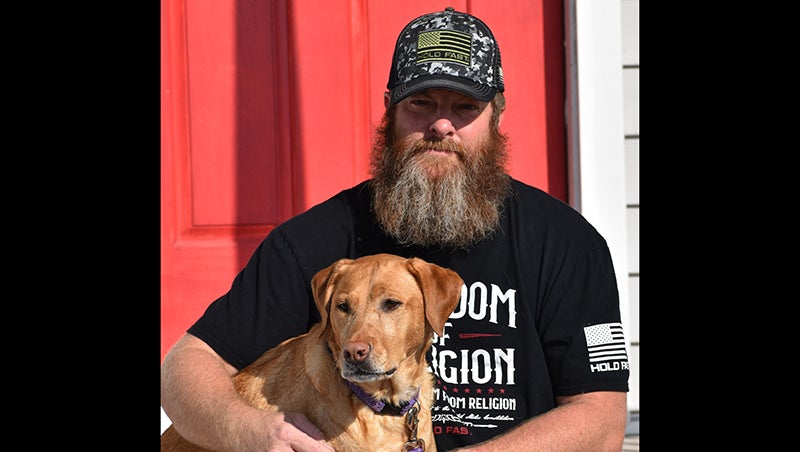Two Albemarle Regional Health Services employees dismissed over vaccine mandate
Published 6:17 pm Monday, January 3, 2022

- David Swinney with dog Christi, who has been with the family since Christmas 2015. Courtesy photo
|
Getting your Trinity Audio player ready...
|
After 19.5 years of employment with Albemarle Regional Health Services (ARHS), environmental health specialist David Swinney, 44, was dismissed for refusing to get the COVID-19 vaccine.
ARHS health director R. Battle Betts Jr. issued the vaccine mandate for employees via memo on August 26, 2021, requiring proof of vaccinations by September 10. Said the memo, “All ARHS employees, contract employees, students and volunteers should be fully vaccinated by November 1, 2021. Anyone not fully vaccinated by November 1, 2021 will be subject to disciplinary action up to and including dismissal.”
Swinney said he waited until the last possible opportunity to ask for an exemption in case the policy was revoked. “I was under the impression that things might change,” he said. But things didn’t change. After seeking personal and legal counsel, he sent a written request via email to Betts on Friday, October 29 at 11:51 a.m. for a religious exemption, citing NC Gen Stat § 130A-157, The Public Health Law of North Carolina.
The statute reads: “If the bona fide religious beliefs of an adult or the parent, guardian or person in loco parentis of a child are contrary to the immunization requirements contained in this Chapter, the adult or the child shall be exempt from the requirements. Upon submission of a written statement of the bona fide religious beliefs and opposition to the immunization requirements, the person may attend the college, university, school or facility without presenting a certificate of immunization.”
A portion of the Swinney’s request reads: “Initially when I began to pray about Covid and the vaccine I felt God tell me, ‘Put my faith in God NOT the vaccine.’ I have prayed and fasted over this issue for many months now and continue to get the same guidance and direction from the Lord. I have and will continue to place my faith in God and seek His guidance. For me to take the Covid-19 vaccine would be contrary to my religious beliefs.”
Twelve minutes later, at 12:03 p.m., Betts responded, in part “…While I do not doubt the conviction of your religious beliefs, due to the nature of your position and the high face to face contact you have with the public, ARHS will not be able to accommodate your request due to the nature of your work.”
Swinney was issued a first written warming “for unacceptable personal conduct due to the willful violation of work rules.” At the scheduled meeting at Pasquotank County Health Department on Monday, November 1, Swinney, Betts, director of human resources Suzanne Ott and director of nursing and clinical services Nancy Nash were present to discuss Swinney’s written warning and answer any questions or concerns he had about the vaccine.
According to Swinney, when he asked if fully vaccinated people can contract and spread COVID-19, “Mr. Betts answered in a long answer that meant YES.” According to the meeting notes taken by Swinney, he was told that there were no alternatives to the vaccine mandate, including antibody testing.
Swinney was given until November 4 to submit proof to human resources of his first dose of the Pfizer or Moderna vaccine or single dose of the Johnson & Johnson vaccine. A portion of the warning signed by Betts read, “You will submit to weekly testing until you are vaccinated or separation . . . While you are unvaccinated, you will not be permitted to go into facilities, homes, places of business, or conduct on-site inspections.”
On November 4, Swinney submitted another request via email for a religious exemption to the COVID-19 vaccine. The next day it was again denied. A second written warning was issued, followed by a second meeting scheduled for November 9 with the same people in attendance, as well as Swinney’s supervisors Kevin Carver and Ralph Hollowell, at Swinney’s request.
At the meeting, Swinney was offered verbal temporary accommodations which included the moving of his office from Camden to Currituck, weekly COVID-19 testing, proper fitting of an N-95 mask to be worn from 8 a.m. to 5 p.m. while in the building (which may have required him shaving his longtime beard). According to Swinney’s meeting notes, the accommodations were temporary, “could be 30 days could be 5 years” and would be in place “as long as there was NO additional waste of agency time or resources, or no cost to the agency” and “as long as NO coworker or customer complaints received.”
The accommodations were not an acceptance of Swinney’s religious exemption request.
On November 9 Swinney received a letter from Betts, a “formal notification that I am considering terminating you from your position” and a request to attend a pre-dismissal conference the following morning.
According to Swinney’s notes from the November 10 meeting, when he asked if the accommodations were an acceptance of his religious exemption request, he was told no: “Mr. Betts stated that my religious exemption was not valid and he had talked to umpteen different lawyers that verified this for him. Mr. Betts stated that my religious exemption was not even up for discussion, that these accommodations were being offered to me because my supervisors Ralph and Kevin had been fighting to keep me.”
Prior to the vaccine mandate, Swinney said he had no written reprimands in his file for almost two decades of employment and always received positive evaluations. “As far as I know – and I don’t want this to sound cocky – but I was an exemplary employee,” he said.
When asked by The Coastland Times why he did not accept the accommodations offered, Swinney said, “To me they felt a little threatening and little accusational, [like the part that said] no additional waste of agency time and resources. These temporary accommodations were in place as long as these requirements were followed and no complaints were received. Getting along for another 10 years with coworkers who were coerced to get the vaccine when I didn’t, are you going to be happy about it or make a complaint? I was looking for a guarantee in writing. I didn’t want to make any assumptions.”
According to Swinney, Betts said they were at an impasse if Swinney was not willing to accept the accommodations offered. He was notified that he would receive a final determination from Betts on November 12.
At this pre-dismissal meeting, Swinney said he had yet to receive accommodations in writing.
The dismissal letter to Swinney from Betts on November 12 included the first written accommodations that Swinney received. These accommodations were the same as what was offered verbally, though no mention was made of no further waste of agency resources or no complaints from co-workers.
In the dismissal letter, Betts writes “Based on my review of all information available, I am dismissing you from your position as an Environmental Health Specialist effective today, November 12, 2021. My decision is based on your willful violation of the ARHS Employee Immunization policy and your refusal to accept the offered, reasonable accommodations. As a public health agency, I have a responsibility to use all resources available, including an FDA approved vaccine, to protect the community members and clients we serve, ARHS staff, interns, and volunteers from the COVID-19 virus. It would be negligent of me to allow ARHS employees to come in contact with others while performing assigned duties without taking every measure possible to reduce the spread of a highly contagious, deadly virus.”
Though he declined to comment specifically on Swinney’s termination, nor did he respond when asked if ARHS considers religious exemptions as an acceptable reason for employees to reject the COVID-19 vaccine, Betts did state: “ARHS recognizes and respects the rights of our staff to the free exercise of their religion, and we have followed the requirements of applicable federal and state law in accommodating religious practices and beliefs . . . At ARHS, our decisions are always based on what is best for public health and public safety. We rely on and follow processes that are guided by various sources including the State, the School of Government, and legal counsel to ensure that our actions are consistent with the law and best practices.”
Some community members are concerned about the potential backlog in permitting with Swinney’s absence. He was authorized to perform inspections and issue permits for onsite wastewater, private wells, food and lodging and child care. In addition to his bachelor’s degree from ECSU in geology with a minor in environmental science, he is a certified subsurface operator, a grade II biological wastewater operator, a grade IV onsite installer and inspector and a registered environmental health specialist.
“I managed the complicated systems. If there were five different manufacturers, there were five different certifications. One of my licenses it took me almost two years to complete. You had to take a college class, then a written exam, then six months of experience, then a second written exam.”
Though the county has filled all environmental health specialist positions, said Swinney, “To learn the process, including all laws and rule changes, I think it would take someone 2-5 years to be proficient.”
At the December 6 Currituck Board of Commissioners meeting, the conversation became heated as Vice Chairman Paul Beaumont brought to the attention of the board the apparent contradiction in the resolution passed by the board that night in the consent agenda entitled, “Resolution in Support of Individual Freedom Over Personal Vaccination Status,” and Beaumont’s statement that Albemarle Regional Health Services (ARHS) recently terminated two environmental health specialists for allegedly not having the COVID-19 vaccine.
Said Beaumont: “I have a lack of confidence with the way it was managed. I’m going to go on record tonight and state that I believe that the way this was done was completely wrong. I think that there’s a lot of cover six going on right now and I think that to suggest . . . that two brand new hires – one of which is going to fulfill the roles of somebody that had been in this system, in this region, for as long as he has been – to suggest that they’re going to walk in and be able to take over tomorrow is disingenuous at the least.”
Chairman Mike Payment, who serves as the county’s representative on the ARHS Board of Health, was hesitant to discuss the matter in the Board of Commissioners setting, but did state several times that all 13 environmental health specialist positions were filled and the county was not experiencing a delay in permitting (2-2.5 weeks this year compared to 3-3.5 weeks at this time last year).
Commissioner Kevin McCord, who was heavily involved in coordinating the COVID-19 vaccine clinics through ARHS said, “We did these COVID clinics. We were a good partner and when we expressed concerns [to ARHS] it didn’t matter. I think as a partner it’s a two-way street.”
Of ARHS director Betts, Beaumont said, “We basically greenlighted him and let him do whatever he wanted to do. And you know Currituck County has led the region and philosophy of individual freedoms and your ability to choose how you want to react, how you want to respond and this, this is not us. This is not us.”
The fourth paragraph of the resolution reads: “WHEREAS, there are various reasons why Americans choose not to be vaccinated, including, but not limited to, established medical conditions, previous infection and recovery, preference for therapeutics; robust immune systems; prevention of potential adverse events; religious beliefs; intolerance to vaccine ingredients; previous anaphylactic and other reactions; and … NOW, THEREFORE, BE IT RESOLVED by the Currituck County Board of Commissioners that the board upholds the United States Constitution and fully supports the individual freedom to choose whether to be vaccinated or unvaccinated and, while recognizing the historical efficacy of proven vaccines in public health, rejects policies of mandatory vaccination regardless of Food and Drug Administration approval, rejects proposals for statewide, nationwide, or global ‘vaccine passports,’ ‘health passes’ or similar policies. The board further thanks and supports members of the North Carolina General Assembly, local government officials and other elected officials for their continued efforts to ensure that individual freedom to be vaccinated or unvaccinated without penalty or discrimination is fully protected.”
In an interview, Payment later affirmed that Betts’s actions were fully supported by the ARHS executive board, which is made up of one commissioner from each of the eight counties served and handles matters like approving the annual budget, approving funding, reviewing the director and setting policies like vacation time, raises and operations. “We support Battle in what he feels is in the best interest of all the citizens. If he felt that [a vaccine mandate] was needed I support it. The entire board did, if he felt it was best for our employees and the citizens they came in contact with,” Payment said.
Payment clarified that the executive board never formally voted on the mandate: “In August, Battle told the executive board that he’s not sure but he may do a vaccine mandate for all the employees, just letting us know. He might require it, depending on what he’s seeing out there because [employees] go into nursing homes and different areas. We said, ‘Just let us know what your decision is.’”
In October, Battle notified the board that he’d like to do an employee vaccine requirement. “The board collectively said that’s fine, you make the decision that is best for the citizens and the county. Be prepared to act on whatever you have to do. We all agreed if he wanted to do that, that’s fine because he knows what the employees were doing,” Payment recalled. He said the board did not specifically discuss medical or religious exemptions, but rather told Betts, “If you make that decision, you and the HR department handle all employee matters.”
According to Payment, the ARHS executive board does not get involved in personnel matters, except for when a complaint is received. In the event of an employee complaint, the board follows a procedure and schedules a hearing. As of this writing, the executive board has received no formal complaint.

Brittany Stevenson. Courtesy photo
Also dismissed was Brittany Stevenson, employed by ARHS for 3.5 years and the only person among eight counties authorized to do the child lead program. Stevenson, like Swinney, appealed two times for a religious exemption, which was denied. “It was very stressful. I did a lot of praying,” she said of the whole experience. “I thought a religious exemption was protected in North Carolina. I was caught off guard and wasn’t prepared. It was really hard with the holidays just around the corner.”
Stevenson did annual monitoring with 29 homes that have been exposed to lead, with 15 to 20 current cases. She had just opened three new cases that she wasn’t allowed to access once the warnings began. “I don’t cry a whole lot but that’s what got me – there’s nobody else there to help these people – I am the only person in the county [authorized in the child lead program].”
As for Swinney, his future is uncertain. “Finances are stressful, the mortgage is coming up. I was planning on a 30-35 year career with the health department. Where’s my retirement? I’m having to pay out of pocket for health insurance and plan ahead differently. I’d have retired at full benefit.”
Swinney received his 240 hours of vacation time but said he lost most of his sick leave. Moving forward, he’s enjoying spending more time with his family and working on their farm in Perquimans County. “Whether I have employment after January, honestly I don’t know. I thought I had a good reputation. I don’t know how that will be affected if I try to go to another county. I may just do septic system maintenance. Part of me is at peace, but I live in a human body and I’m human, so I’m weak sometimes.”
Swinney continued, “But my faith is in God. He has something bigger for me. If he’s closed the door, there’s something bigger and better ahead.”






